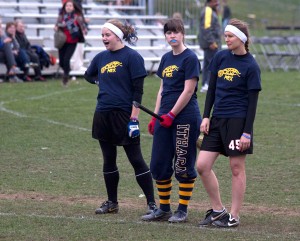Players run up and down the field seven to a team. A few carry balls, a couple others bats. It looks like they could be playing a traditional American sport if not for the brooms between the players’ legs, hoops in the air and the cross-country runner dressed completely in yellow spandex.
This hybrid of dodgeball, soccer and baseball is called Muggle Quidditch, and the students playing it are The Hex, Ithaca’s community Quidditch Team.

After almost a year of practice and working to become a full team, The Hex got the opportunity to show its skill outside of Ithaca. During the second weekend of November, the team traveled to the Fifth Annual Quidditch World Cup. The tournament stretched across 10 fields on Randall’s Island in New York City. The event was not only the team’s Cup debut, but also its first official match, an earlier informal scrimmage versus Cornell excluded.
Junior Caitlin Ghegan, the team’s coach, said she appreciates the kinship of the team. She said they often call her “Mama Weasley,” after Potter’s beloved maternal figure.
“We got a lot of freshmen, and there’s potential here to keep growing,” she said. “I know when I was a freshman, I would’ve loved to have had that community.”
Students at Middlebury College invented the game in 2005 based on the sport in J.K. Rowling’s Harry Potter series. The charmed balls that fly independently in the fictional world of Harry Potter may be missing, but the magic is not. Since its inception, the sport’s popularity has exploded at universities, colleges and even high schools.
Junior Tom Aroune, team captain and founder, began playing the sport his freshman year with a few friends. By the next fall, the team was a visible entity often found practicing on the quad by Campus Center. With the assistance of sports management majors, a tournament was planned for November 2010, but failed to kick off the ground due to safety concerns surrounding the unofficial team and unrecognized sport at the college.
The Hex grew in size from about 15 regulars — and the friends they convinced to occasionally tag-along last year — to nearly 30 people, with an influx of enthusiastic freshmen this year. Some freshmen, like Erik Jaworski and Morgan Schuman, came to The Hex with high school Quidditch experience.
Schuman said she also enjoys the team feel of the sport.
“We’re like a family,” she said.
Almost 100 teams from five countries competed in the display of both athleticism and creativity organized by the International Quidditch Association. Creative uniforms, banners and mascots decorated the island. One team, named the Badassilisks, brought a Basilisk mascot, the mythical snake-like monster from the Harry Potter series.
About 20 players from The Hex were able to compete in the games against top Quidditch teams, including Texas A&M University, Vassar College, the University of Miami and New York University.
Schuman said the team had a rough start.
“We had a really tough bracket,” Schuman said. “Our first game was against Texas A&M, who was in the semifinals, so that was an interesting experience.”
Jaworski said the competition was difficult, but said The Hex improved as the games progressed.
“We were paired up with two of the teams that were favored to win the World Cup,” he said. “We got brutally murdered by Texas A&M, but we progressed slowly but surely afterwards. The NYU game was very close. It was anybody’s game.”
Despite their losses, Ghegan said, the Cup was still enchanting.
“It was exciting to meet [other teams] and watch them play and see what other schools did,” Ghegan said.
After the games, Vassar players invited The Hex to its Butterbeer
Invitational in the spring, but for now the team is resting after the Cup and collaborating with the Harry Potter Alliance, a student group that works to raise awareness about the social issues featured in the book series. For any student wanting to play or just learn more about the sport, Arroune said there will always be a friendly game on campus.
“We play Quidditch for Quidditch’s sake,” he said. “To have fun.”




